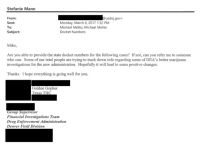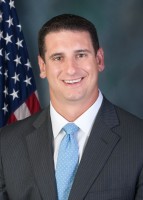Two weeks ago, we reported on the State of Washington choosing Franwell as their apparent successful vendor (ASV) for their seed-to-sale traceability system contract. Late last week, the Washington State Liquor and Cannabis Board (WSLCB) sent out an email explaining that they are no longer going with Franwell and the new ASV is MJ Freeway.
 The email (left) consisted of a letter sent by Peter Antolin, Deputy Director of the WSLCB, to licensees “who had written to the Board and staff regarding the marijuana traceability Apparent Successful Vendor and RFID tags.” Apparently, the reason behind switching the ASV to MJ Freeway is because Franwell’s system requires only one method for tagging plants- RFID tags. According to the letter, Deputy Director Antolin says the initial request for proposal (RFP) stated that the traceability system needs to support a variety of tagging methods, including bar codes and RFID. “The RFP requirements did not allow a vendor to make any assumptions regarding use of a single tagging methodology or allow vendors to include any such costs affecting the state or our licensees in their proposal,” says Antolin. As they made clear in the previous press release, the ASV is not the official contract winner until they complete negotiations and sign the contract.
The email (left) consisted of a letter sent by Peter Antolin, Deputy Director of the WSLCB, to licensees “who had written to the Board and staff regarding the marijuana traceability Apparent Successful Vendor and RFID tags.” Apparently, the reason behind switching the ASV to MJ Freeway is because Franwell’s system requires only one method for tagging plants- RFID tags. According to the letter, Deputy Director Antolin says the initial request for proposal (RFP) stated that the traceability system needs to support a variety of tagging methods, including bar codes and RFID. “The RFP requirements did not allow a vendor to make any assumptions regarding use of a single tagging methodology or allow vendors to include any such costs affecting the state or our licensees in their proposal,” says Antolin. As they made clear in the previous press release, the ASV is not the official contract winner until they complete negotiations and sign the contract.
On June 7th, Franwell withdrew their proposal for the state’s traceability system, thus Washington went with the second highest scoring vendor, MJ Freeway. Deputy Director Antolin says they submitted a strong bid, but there are still many questions left unanswered. How could such a glaring mistake be overlooked when the state named Franwell the highest scoring bidder? Is MJ Freeway’s system robust enough and capable of handling the state’s cannabis licensees’ traceability requirements even though they were not the highest scoring bidder? The deadline for the new system to be in place is October 31, 2017, which is quickly approaching for such a massive systems overhaul.
 The WSLCB’s oversight highlights a few inadequacies with the state’s regulatory agency, particularly their indecision and lack of foresight. So much of the concept behind seed-to-sale traceability rests on Cole Memo compliance. A big reason why some states seek to implement a robust tracking system is to remain compliant with the Cole Memo; preventing diversion to crime organizations with regulatory oversight is a key tool that states use to tell the federal government they are complying with their directive and intend to protect their state’s legal cannabis operations from federal prosecution. Without a proper system in place, the state runs the risk of exposing their entire cannabis market to threats of federal enforcement, a scenario that seems unlikely but could be disastrous to cannabis businesses and the local economy.
The WSLCB’s oversight highlights a few inadequacies with the state’s regulatory agency, particularly their indecision and lack of foresight. So much of the concept behind seed-to-sale traceability rests on Cole Memo compliance. A big reason why some states seek to implement a robust tracking system is to remain compliant with the Cole Memo; preventing diversion to crime organizations with regulatory oversight is a key tool that states use to tell the federal government they are complying with their directive and intend to protect their state’s legal cannabis operations from federal prosecution. Without a proper system in place, the state runs the risk of exposing their entire cannabis market to threats of federal enforcement, a scenario that seems unlikely but could be disastrous to cannabis businesses and the local economy.
The WSLCB needs to get their act together fast.



 While the release states they have not yet officially awarded them the contract, it says Franwell is the apparent successful vendor (ASV) to replace their current system. “An ASV is the procurement term used for the highest scoring, responsive vendor,” says the press release.
While the release states they have not yet officially awarded them the contract, it says Franwell is the apparent successful vendor (ASV) to replace their current system. “An ASV is the procurement term used for the highest scoring, responsive vendor,” says the press release.















